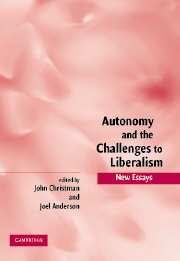Book contents
- Frontmatter
- Contents
- Contributors
- Preface
- Autonomy and the Challenges to Liberalism
- 1 Introduction
- PART I THE SELF: CONCEPTIONS OF THE AUTONOMOUS SELF
- PART II THE INTERPERSONAL: PERSONAL AUTHORITY AND INTERPERSONAL RECOGNITION
- PART III THE SOCIAL: PUBLIC POLICY AND LIBERAL PRINCIPLES
- PART IV THE POLITICAL: LIBERALISM, LEGITIMACY, AND PUBLIC REASON
- Bibliography
- Index
1 - Introduction
Published online by Cambridge University Press: 02 December 2009
- Frontmatter
- Contents
- Contributors
- Preface
- Autonomy and the Challenges to Liberalism
- 1 Introduction
- PART I THE SELF: CONCEPTIONS OF THE AUTONOMOUS SELF
- PART II THE INTERPERSONAL: PERSONAL AUTHORITY AND INTERPERSONAL RECOGNITION
- PART III THE SOCIAL: PUBLIC POLICY AND LIBERAL PRINCIPLES
- PART IV THE POLITICAL: LIBERALISM, LEGITIMACY, AND PUBLIC REASON
- Bibliography
- Index
Summary
Recent theoretical debates over political liberalism address a wide variety of issues, from citizenship and minority rights to the role of constitutional foundations and democratic deliberation. At stake in virtually all of these discussions, however, is the nature of the autonomous agent, whose perspective and interests are fundamental for the derivation of liberal principles. The autonomous citizen acts as a model for the basic interests protected by liberal principles of justice as well as the representative rational agent whose hypothetical or actual choices serve to legitimize those principles. Whether implicitly or explicitly, then, crucial questions raised about the acceptability of the liberal project hinge on questions about the meaning and representative authority of the autonomous agent. Similarly, in the extensive recent philosophical literature on the nature of autonomy, debates over the content-neutrality of autonomy or the social conditions necessary for its exercise ultimately turn on issues of the scope of privacy, the nature of rights, the scope of our obligation to others, claims to welfare, and so on – the very issues that are at the heart of discussions of liberalism regarding the legitimate political, social, and legal order.
Despite the conceptual and practical interdependence of liberalism and autonomy, however, the recent literature on liberalism has developed without much engagement with the parallel boom in philosophical work on autonomy, and vice versa. This book serves as a point of intersection for these parallel paths.
- Type
- Chapter
- Information
- Autonomy and the Challenges to LiberalismNew Essays, pp. 1 - 24Publisher: Cambridge University PressPrint publication year: 2005
- 6
- Cited by

